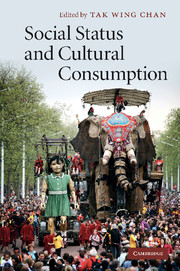Book contents
- Frontmatter
- Contents
- List of figures
- List of tables
- List of contributors
- Acknowledgments
- 1 Social status and cultural consumption
- 2 The social status scale: its construction and properties
- 3 Social stratification and musical consumption: highbrow–middlebrow in the United States
- 4 Bourdieu's legacy and the class–status debate on cultural consumption: musical consumption in contemporary France
- 5 Social status and public cultural consumption: Chile in comparative perspective
- 6 Social stratification and cultural participation in Hungary: a post-communist pattern of consumption?
- 7 Status, class and culture in the Netherlands
- 8 Social stratification of cultural consumption across three domains: music; theatre, dance and cinema; and the visual arts
- 9 Conclusion
- References
- Index
7 - Status, class and culture in the Netherlands
Published online by Cambridge University Press: 07 May 2010
- Frontmatter
- Contents
- List of figures
- List of tables
- List of contributors
- Acknowledgments
- 1 Social status and cultural consumption
- 2 The social status scale: its construction and properties
- 3 Social stratification and musical consumption: highbrow–middlebrow in the United States
- 4 Bourdieu's legacy and the class–status debate on cultural consumption: musical consumption in contemporary France
- 5 Social status and public cultural consumption: Chile in comparative perspective
- 6 Social stratification and cultural participation in Hungary: a post-communist pattern of consumption?
- 7 Status, class and culture in the Netherlands
- 8 Social stratification of cultural consumption across three domains: music; theatre, dance and cinema; and the visual arts
- 9 Conclusion
- References
- Index
Summary
Introduction
Cultural consumption in present-day highly industrialised societies is a leisure activity with a distinct social base. People's tastes and lifestyles are not pre-given and do not develop in a vacuum. Socialisation, starting in the family of origin, strongly stamps cultural preferences and activities (Bourdieu, 1984). Later on, the schools a person attends are likely to affect taste in cultural matters (Ganzeboom, 1982). Yet, even in adult life cultural consumption is not fixed. Theatre-going and museum visits are fuelled by significant others such as friends and, most notably, a person's spouse or partner (van Berkel and de Graaf, 1995).
Many research findings speak in favour of the social roots of cultural lifestyles. This, however, does not mean that there is agreement on which concrete social phenomena should be taken into consideration when explaining cultural tastes and activities. Findings from sample surveys indicate that cultural consumption is affected by parental schooling levels and aspects of family socialisation (Mohr and DiMaggio, 1995; van Eijck, 1997; Nagel and Ganzeboom, 2002), level and type of education (DiMaggio and Mukhtar, 2004; van de Werfhorst and Kraaykamp, 2001), occupational class (Katz-Gerro, 2002; Chan and Goldthorpe, 2005), income (DiMaggio and Useem, 1978; O'Hagan, 1996), social network (Erickson, 1996; Warde and Tampubolon, 2002), and cultural preferences and background characteristics of the partner (Upright, 2004).
All of these determinants of cultural consumption are in some way related to issues of class and status. One of the current controversies surrounding cultural tastes and activities is the question of whether status or class is a more influential characteristic.
- Type
- Chapter
- Information
- Social Status and Cultural Consumption , pp. 169 - 203Publisher: Cambridge University PressPrint publication year: 2010
- 5
- Cited by



